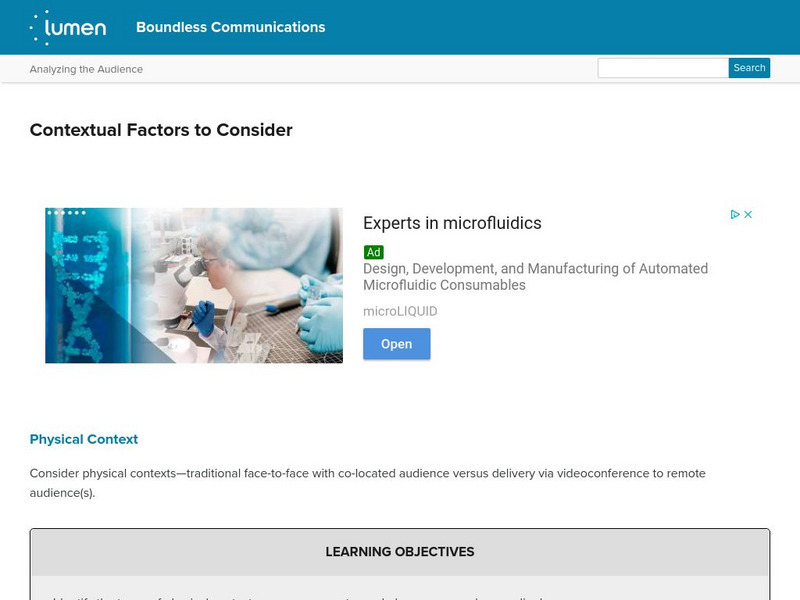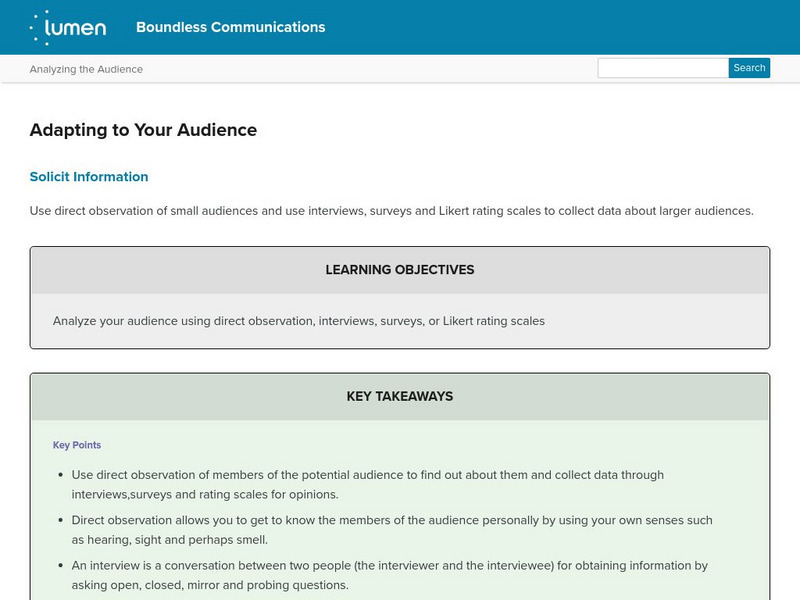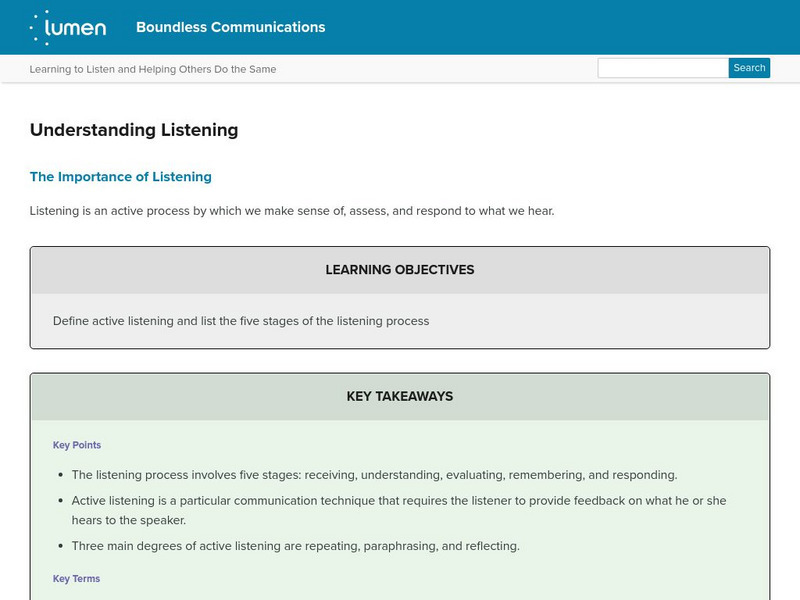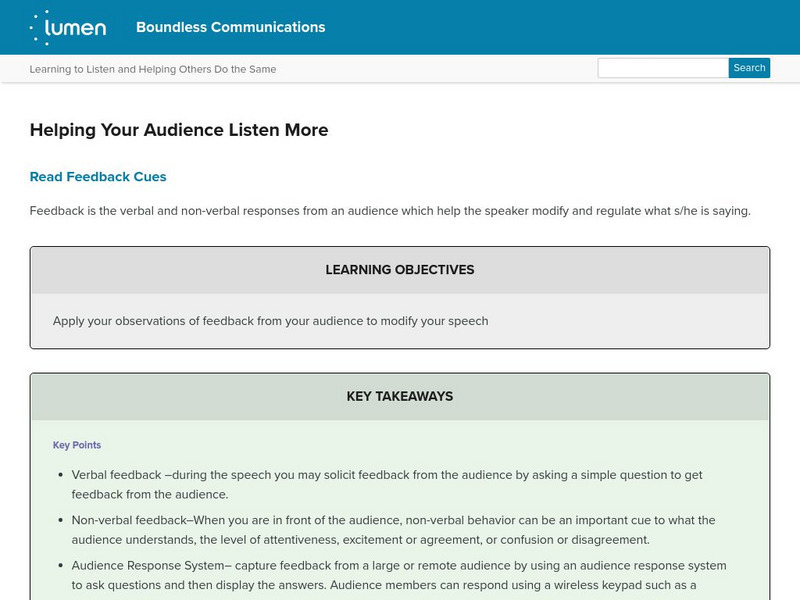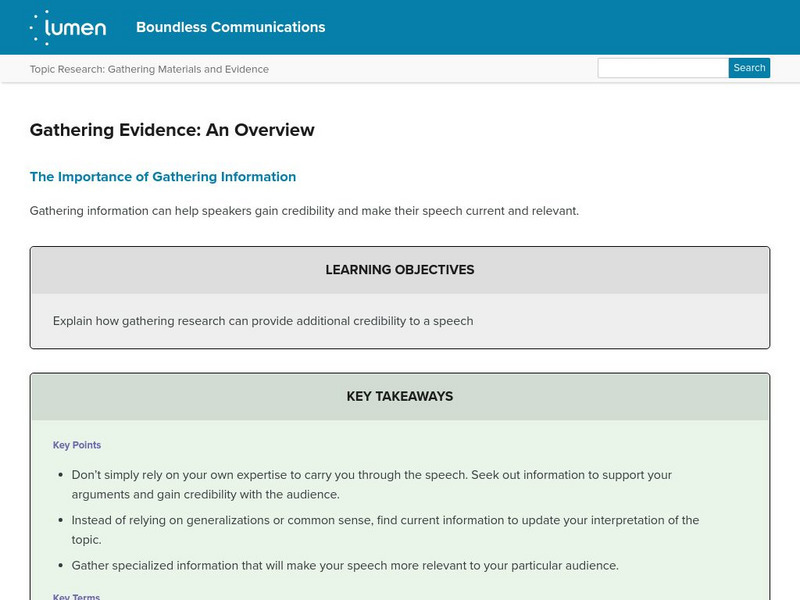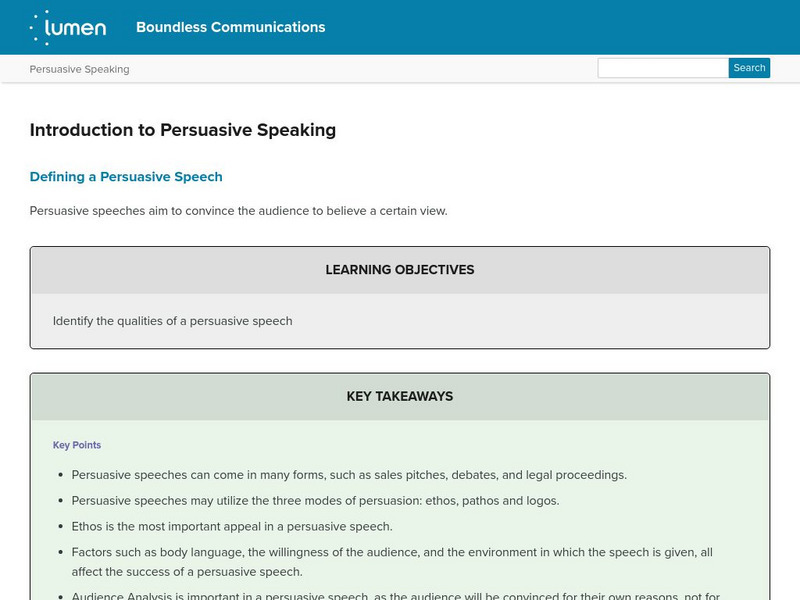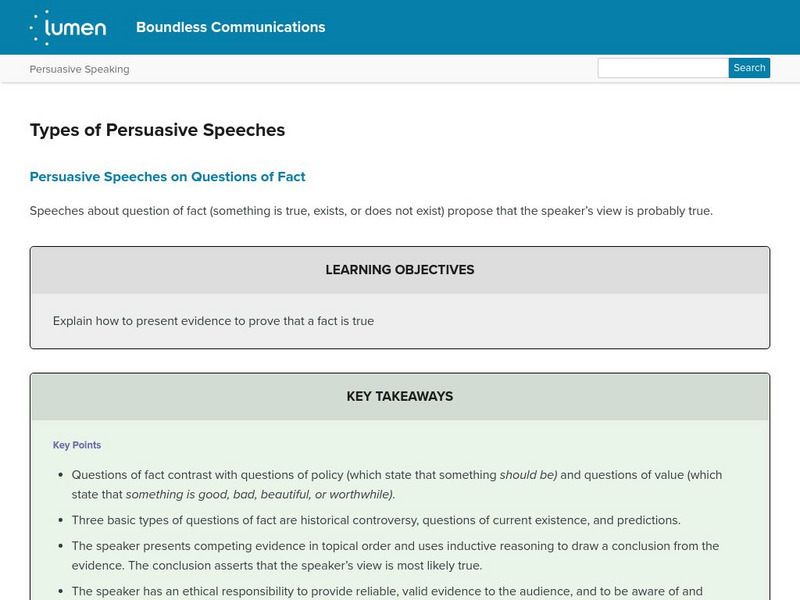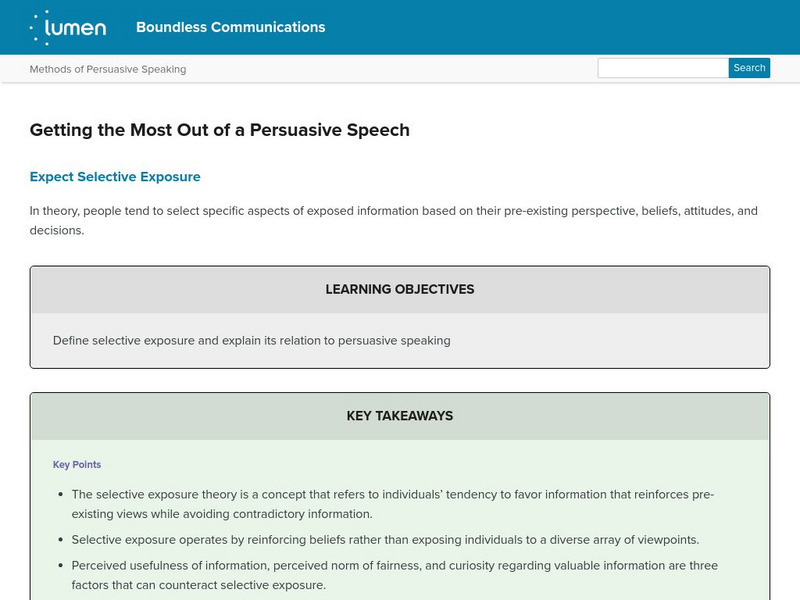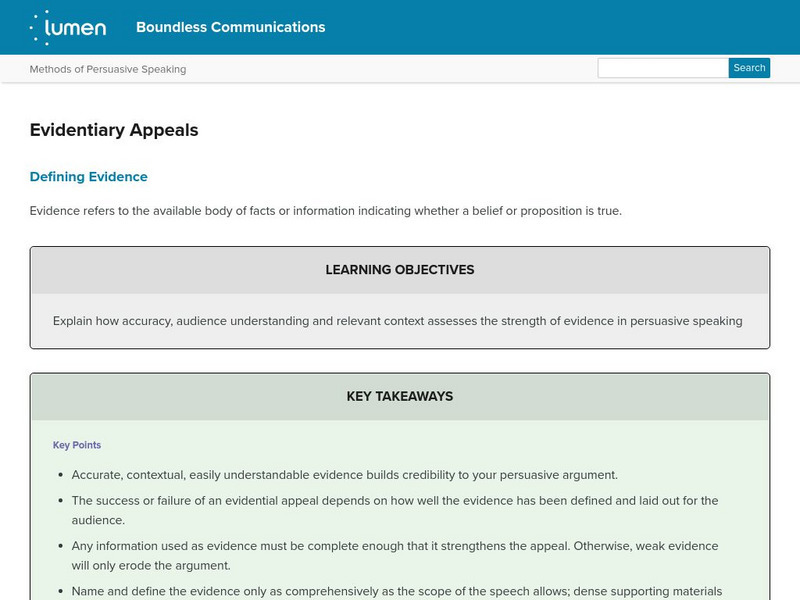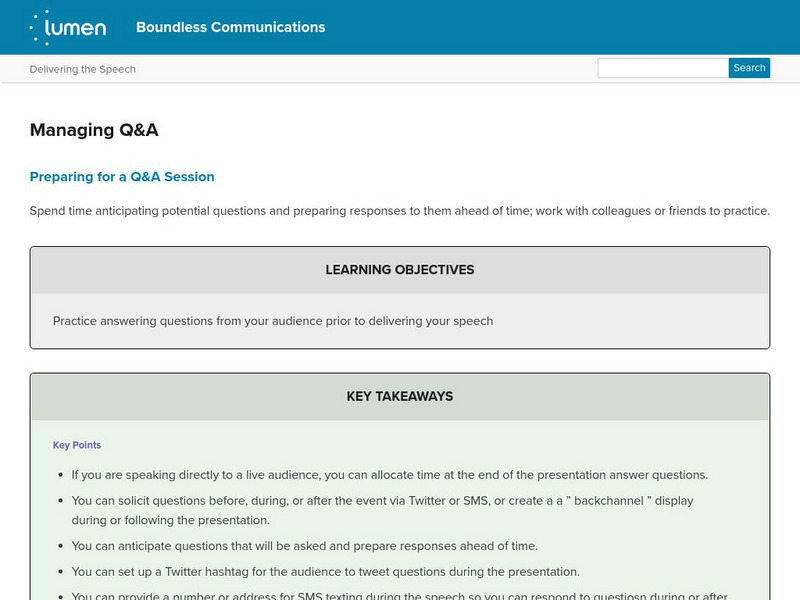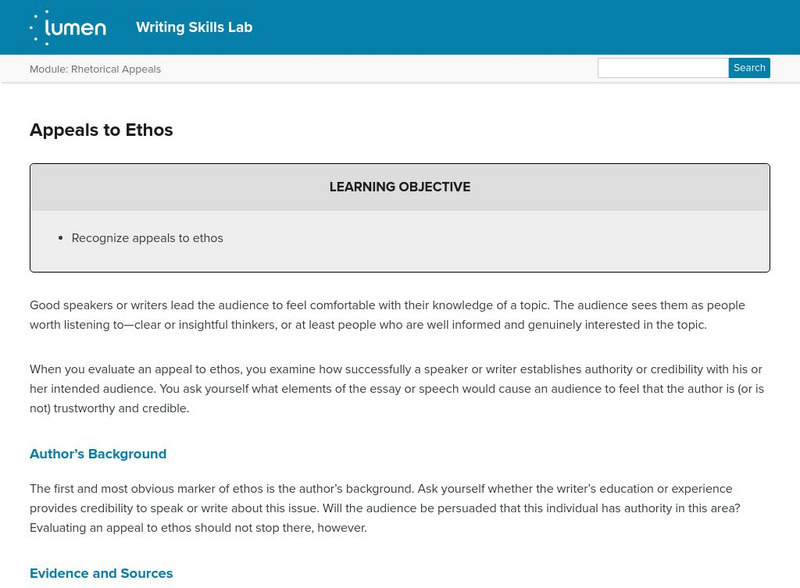Lumen Learning
Lumen: Boundless Communications: Contextual Factors to Consider
This lesson focuses on contextual factors to consider when analyzing your audience including physical contexts, values, beliefs, attitudes, and needs, audience opinion of you and your topic, and audience knowledge of your topic.
Lumen Learning
Lumen: Boundless Communications: Adapting to Your Audience
This lesson focuses on adapting your speech to your audience including analyzing your audience using direct observation, interviews, surveys, or Likert rating scales and then apply knowledge about the audience to adjust the message...
Lumen Learning
Lumen: Boundless Communications: Elements of Speech Communication
This lesson discusses the elements of speech communication including the speaker, message, types of channels, audience, and feedback.
Lumen Learning
Lumen: Boundless Communications: Understanding Listening
This lesson focuses on understanding listening including defining active listening, the five stages of the listening process, listening and critical thinking, and the four main barriers to effective listening.
Lumen Learning
Lumen: Boundless Communications: Helping Your Audience Listen More
This lesson focuses on helping your audience listen better by offering strategies such as read feedback cues, employ strategies for maintaining audience focus, use strategies to maximize audience understanding, build credibility, and...
Lumen Learning
Lumen: Boundless Communications: Finding and Selecting a Topic
This instructional activity focuses on selecting a speech topic including the importance of choosing a good topic by considering your areas of expertise and areas of interest, brainstorming, tips for choosing a topic, and narrowing the...
Lumen Learning
Lumen: Boundless Communications: Gathering Evidence: An Overview
This lesson plan focuses on the importance of gathering information that provides evidence for your topic that is credible, current, and relevant. It also discusses how to find and evaluate sources. SL.9-10.1a Prepared/Discuss
Lumen Learning
Lumen: Boundless Communications: Introduction to Persuasive Speaking
This lesson focuses on persuasive speaking including identifying the qualities, components, goals, and ethics of persuasive speaking.
Lumen Learning
Lumen: Boundless Communications: Types of Persuasive Speeches
This instructional activity focuses on three basic types of persuasive speeches: fact, value, and policy and information about each. It also provides questions you should ask yourself when analyzing a speech.
Lumen Learning
Lumen: Boundless Communications: Getting the Most Out of a Persuasive Speech
This lesson focuses on presenting a good persuasive speech. It discusses the selective exposure theory, kinds of appeals, and expectations.
Lumen Learning
Lumen: Boundless Communications: Evidentiary Appeals
This lesson plan focuses on the use of evidentiary appeals in persuasive speeches including definition, evaluating your evidence, and strategies for using evidence effectively. Click on next at the bottom right to continue.
Lumen Learning
Lumen: Boundless Communications: Logical Appeals
This activity focuses on using logical appeals in persuasive speeches including inductive and deductive reasoning, inductive reasoning and associative reasoning, forming a rational appeal, and errors in reasoning-formal and informal.
Lumen Learning
Lumen: Boundless Communications: Principles of Organization
This lesson focuses on the importance of organizing your speech including critically thinking about the contents of the speech, the components of the speech, the patterns of organization to fit the different types of speeches, and...
Lumen Learning
Lumen: Boundless Communications: Main Points
This lesson focuses on choosing the main points of your speech based on your audience and purpose. It also discusses ordering and highlighting your main points using visual and textual cues and using a variety of examples.
Lumen Learning
Lumen: Boundless Communications: Conclusion
This lesson focuses on writing the conclusion of your speech including the role of the conclusion, summarizing ideas, signaling the end, and managing Q&A.
Lumen Learning
Lumen: Boundless Communications: Speaking in the Real World
This lesson focuses on providing practical tips for speaking in a non-academic setting such as a wedding, charity event, or interview.
Lumen Learning
Lumen: Boundless Communications: Interaction in Public Speaking
This lesson focuses on interacting with your audience when delivering a presentation including direct questions and answers and body language.
Lumen Learning
Lumen: Boundless Communications: Managing Q&a
This lesson focuses on answering questions after or during an informative speech including how to prepare for Q&A by anticipating questions and practicing with a friend or colleague and methods of receiving and answering the questions.
Lumen Learning
Lumen: Writing Process: Selecting a Topic
This lesson focuses on selecting a writing topic including your approach to the assignment, understanding the assignment, purpose of the assignment, strategies for finding a topic, and how to narrow a topic to fit the scope and purpose...
Other
Self growth.com: Questioning Skills for Salespeople
The article deals with the difference between open-ended and closed questioning skills. Good questioning techniques can improve business.
Lumen Learning
Lumen: Rhetorical Appeals: Appeals to Ethos
This lesson focuses on appeals to Ethos, When you evaluate an appeal to ethos, how successfully a speaker or writer establishes authority or credibility with his or her intended audience. You ask yourself what elements of the essay or...
Lumen Learning
Lumen: Rhetorical Appeals: Establishing Ethos
This lesson focuses on establishing ethos or credibility. You can establish ethos-or credibility-in two basic ways: you can use or build your own credibility on a topic, or you can use credible sources, which, in turn, builds your...
Lumen Learning
Lumen: Writing Skills: Introduction to Building Common Ground
This introduction discusses the need for researching your audience and learn strategies to find common ground.
Lumen Learning
Lumen: Writing Skills: Formula for Refutation and Rebuttal
This lesson focuses on the formula for refuting and rebutting counterarguments including accurately representing opposing viewpoints, using a respectful, non-incendiary tone, using reliable information, using qualifying words to aid...


